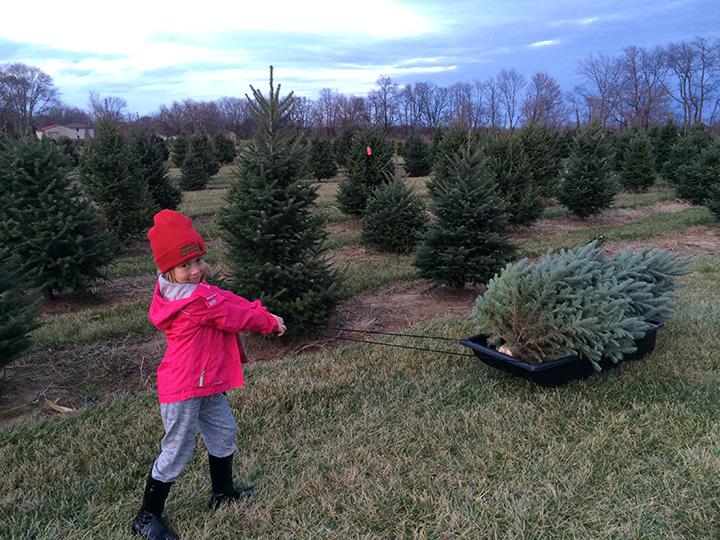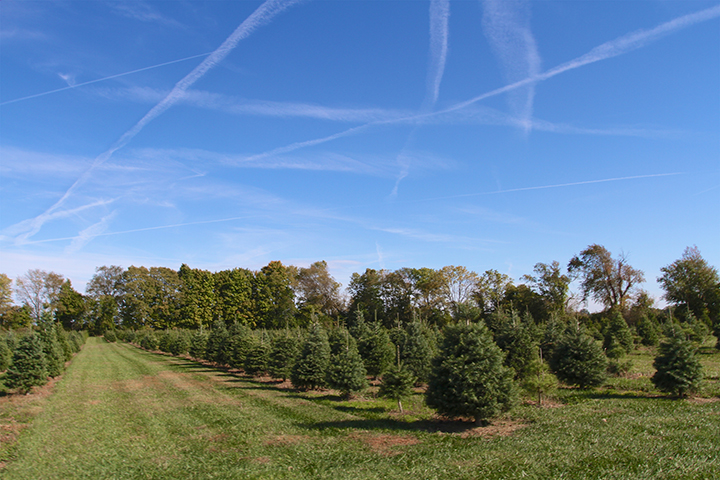
By Sadie Hunter
Picking out a real Christmas tree from a farm or local vendor has been a tradition for many families in real life and in fiction (see the 1983 film “A Christmas Story” or the more unconventional ripping out of the tree in 1989’s “National Lampoon’s Christmas Vacation”).
Locally, Hancock County has the most tree farms (five) of any county in the state, and Sambol’s Tree Farm in Fortville is hoping to keep the tradition alive.
“It’s a neat thing,” owner Lance Sambol said. “It’s fun. You get outside. You experience a little fresh air. Just the hunt to finding that perfect tree is fun.”
Households buying real trees have tapered off through the years, largely because of convenience. Sambol said there are plenty of workers on the farm to cut down the tree and tie it to a customer’s vehicle, but he said many guests also get joy and a sense of pride from picking and chopping down their own tree.

“To be able to process each tree efficiently, we’ve got workers dragging the tree and putting a square cut on the trunk,” Sambol said. “Then, we’ve got a shaker that gets all the dead needles off, and then we drill it if they have a stand with a spike on the bottom, and then we take it to the netter, which compacts it, and then we tie it around the car.”
Before becoming a full-time Christmas tree farmer, Sambol worked in the golf business.
“I had zero tree farm experience,” Sambol said. “I had a golf driving range in McCordsville (Northeast Golf & Practice Center). I had been in the golf business most of my life. So, I sold that in 2007, right before the market crashed. I got out just in time, but I needed to reinvest and start my next business. I didn’t know what it was going to be, and I’m watching the news one day, and they said, ‘The economy is horrible, but here’s a business that’s thriving. We’re live from Dull’s Tree Farm in Thorntown, Indiana.’”
From there, Sambol said he and his wife, Susan, went to the farm to check it out, and after seeing the farm, the rest was history.
The Sambols purchased the farm property in late 2008, which, at the time, was an abandoned cornfield with a for-sale sign and 9-foot-tall weeds.
“I basically spent all of 2009 getting the property ready to plant that fall,” he said.
Each ensuing year, more trees are planted. However, the first trees sold weren’t ready until the holiday season in 2015, a six-year wait.
“That’s the brutal thing about the Christmas tree business,” Sambol said. “We’re six to eight years out now, but a couple years ago I began focusing solely on this. Last year we kind of had a test year. We only had a couple hundred trees available, if that. Those went to family and friends. It was kind of like our ‘soft opening.’”
Now, the farm is home to approximately 10,000 Christmas trees. Each year, Sambol plants around 1,400.
“This year I’ll have in the 500 to 600 range available to sell, and next year, that will be up to 1,000,” he said.
When their daughter Erin, 8, grows up, the Sambols have plans to live on the farm.
“I’ve already got a spot picked out,” Sambol said. “It’ll just be the two of us, and eventually down the road, many years later, when it comes to maybe selling it, it’s turn-key. Someone can buy the whole thing and live here.”
The farm, at 7783 Ind. 9, opens next weekend on the Friday after Thanksgiving, Nov. 25. The farm will be open 2 to 5:30 p.m. weekdays, 10 a.m. to 5:30 p.m. Saturdays, and 11 a.m. to 5:30 p.m. Sundays. He said he expects to close the farm for annual tree sales around Dec. 20.
For more, visit sambolstreefarm.com, or call 317-850-0135.

TYPES OF TREES
Canaan fir ($11/foot): Canaan fir trees are native to eastern and central Canada and the northeastern U.S. This is a small to medium evergreen tree that can grow 46 to 66 feet tall. Aside from its popularity as a Christmas tree, the Canaan fir is used to produce Canada basalm (a type of turpentine), glue, framing lumber, paper, rodent repellent and air fresheners.
Concolor fir: ($11/foot): Concolor fir trees are native to western North American in high elevations. This is a medium to large evergreen coniferous tree that can grow 80 to 195 feet tall. These types of trees are used primarily for landscaping and Christmas trees but are also popular for construction because of the wood’s durability and light weight.
Norway spruce: ($9/foot): The Norway spruce is native to northern, central and eastern Europe. This is a large, fast-growing evergreen coniferous tree that can grow 115 to 180 feet tall. This tree is primarily used for landscaping and as a Christmas tree, but is also used for timber and paper production. The Norway spruce also is the source of spruce beer, often used medicinally, and for stringed instruments.
Black Hills spruce: ($9/foot): Black Hills spruce trees are native to northern forests in northern North America. This tree is a large, evergreen coniferous tree, growing 50 to 100 feet tall. Black Hills spruce trees are largely used for wood and making paper, rarely used as a Christmas tree.
THE CASE FOR A REAL TREE
“Real trees are more environmentally friendly,” owner Lance Sambol said. “When people say, ‘Well, how is that true?’ we tell them about how the artificial tree comes across on a ship from China with a huge carbon footprint. Then, once you’re finished with it, it’s going to be in a landfill, not going anywhere for 100 years. A real tree creates oxygen, helps with soil erosion and is a habitat for birds and wildlife. On my farms and on other farms, we’re only harvesting an eighth of what we have. So, I’m always going to have 8,500 trees in the ground, even if I sell 1,500.”
Real trees can also be recycled. Sambol’s Tree Farm is the sponsor for the City of Fishers’ tree-recycling sites. The Fishers Parks and Recreation Dept. then takes all of the recycled trees, turns them into mulch and then puts the mulch around trees, gardens and playgrounds within city parks.



